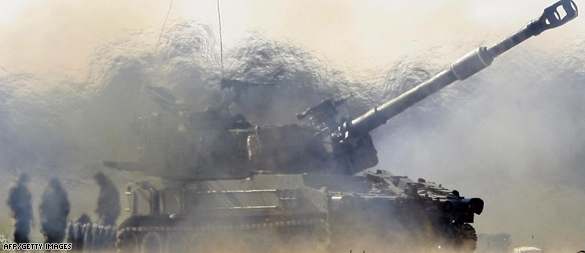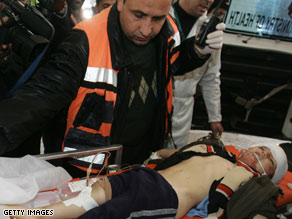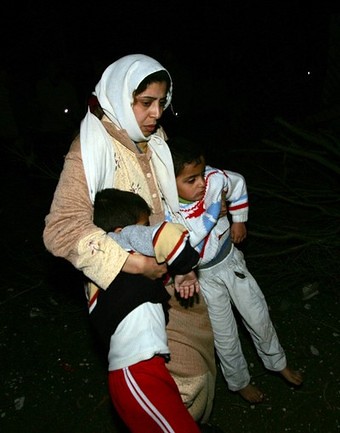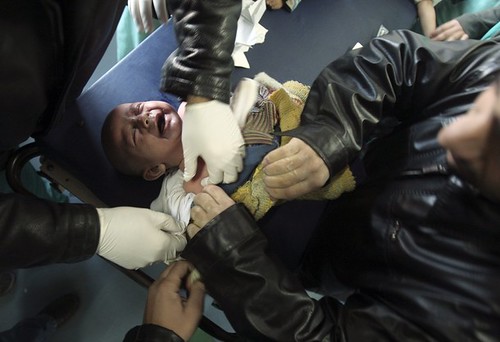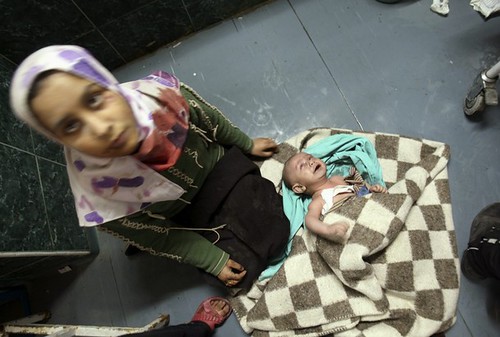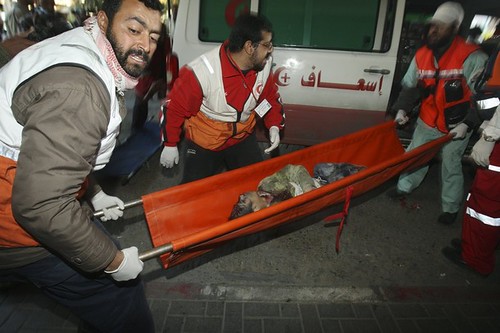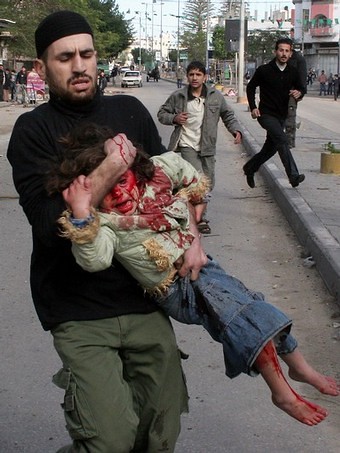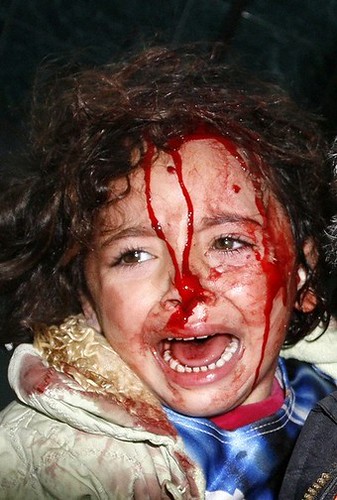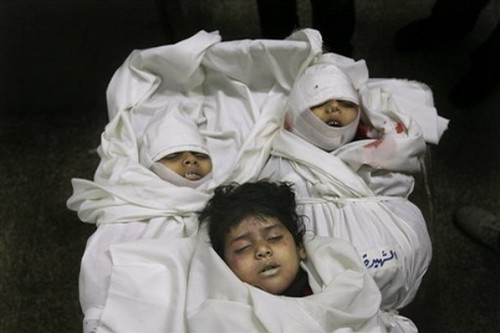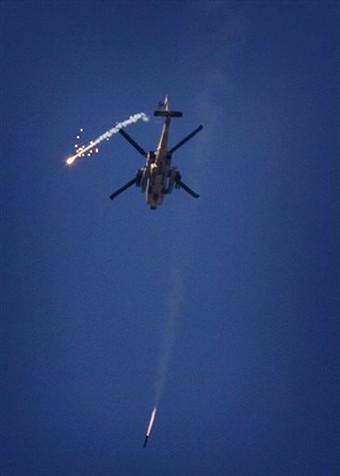Living on Borrowed Time in a Stolen Land
By Gilad Atzmon
January 04, 2009
Communicating with Israelis may leave one bewildered. Even now when the Israeli Air Force is practicing murder in broad daylight of hundreds of civilians, elderly persons, women and children, the Israeli people manage to convince themselves that they are the real victims in this violent saga.
Those who are familiar intimately with Israeli people realise that they are completely uninformed about the roots of the conflict that dominates their lives. Rather often Israelis manage to come up with some bizarre arguments that may make a lot of sense within the Israeli discourse, yet make no sense whatsoever outside of the Jewish street. Such an argument goes as follows: ‘those Palestinians, why do they insist upon living on our land (Israel), why can’t they just settle in Egypt, Syria, Lebanon or any other Arab country?’ Another Hebraic pearl of wisdom sounds like this: ‘what is wrong with these Palestinians? We gave them water, electricity, education and all they do is try to throw us to the sea’.
Astonishingly enough, the Israelis even within the so-called ‘left’ and even the educated ‘left’ fail to understand who the Palestinians are, where they come from and what they stand for. They fail to grasp that for the Palestinians, Palestine is home. Miraculously, the Israelis manage to fail to grasp that Israel had been erected at the expense of the Palestinian people, on Palestinian land, on Palestinian villages, towns, fields and orchards. The Israelis do not realise that Palestinians in Gaza and in refugee camps in the region are actually dispossessed people from Ber Shive, Yafo, Tel Kabir, Shekh Munis, Lod, Haifa, Jerusalem and many more towns and villages. If you wonder how come the Israelis don’t know their history, the answer is pretty simple, they have never been told. The circumstances that led to the Israeli Palestinian conflict are well hidden within their culture. Traces of pre-1948 Palestinian civilisation on the land had been wiped out. Not only the Nakba, the 1948 ethnic cleansing of the indigenous Palestinians, is not part of the Israeli curriculum, it is not even mentioned or discussed in any Israeli official or academic forum.
In the very centre of almost every Israeli town one can a find a 1948 memorial statue displaying a very bizarre, almost abstract, pipe work. The plumbing feature is called Davidka and it is actually a 1948 Israeli mortar cannon. Interestingly enough, the Davidka was an extremely ineffective weapon. Its shells wouldn’t reach more than 300 meters and would cause very limited damage. Though the Davidika would cause just minimal harm, it produced a lot of noise. According to the Israeli official historical narrative, the Arabs i.e., Palestinians, simply ran away for their lives once they heard the Davidka from afar. According to the Israeli narrative, the Jews i.e., ‘new Israelis’ did a bit of fireworks and the ‘Arab cowards’ just ran off like idiots. In the Israeli official narrative there is no mention of the many orchestrated massacres conducted by the young IDF and the paramilitary units that preceded it. There is no mention also of the racist laws that stop Palestinians[1][1] from returning to their homes and lands.
The meaning of the above is pretty simple. Israelis are totally unfamiliar with the Palestinian cause. Hence, they can only interpret the Palestinian struggle as a murderous irrational lunacy. Within the Israeli Judeo- centric solipsistic universe, the Israeli is an innocent victim and the Palestinian is no less than a savage murderer.
This grave situation that leaves the Israeli in the dark regarding his past demolishes any possibility of future reconciliation. Since the Israeli lacks the minimal comprehension of the conflict, he cannot contemplate any possible resolution except extermination or cleansing of the ‘enemy’. All the Israeli is entitled to know are various phantasmic narratives of Jewish suffering. Palestinian pain is completely foreign to his ears. ‘Palestinian right of return’ sounds to him like an amusing idea. Even the most advanced ‘Israeli humanists’ are not ready to share the land with its indigenous inhabitants. This doesn’t leave the Palestinians with many options but to liberate themselves against all odds. Clearly, there is no partner for peace on the Israel side.
This week we all learned more about the ballistic capability of Hamas. Evidently, Hamas was rather restrained with Israel for more than a long while. It refrained from escalating the conflict to the whole of southern Israel. It occurred to me that the barrages of Qassams that have been landing sporadically on Sderot and Ashkelon were actually nothing but a message from the imprisoned Palestinians. First it was a message to the stolen land, homes fields and orchards: ‘Our beloved soil, we didn’t forget, we are still here fighting for you, sooner rather than later, we will come back, we will start again where we had stopped’. But it was also a clear message to the Israelis. ‘You out there, in Sderot, Beer Sheva, Ashkelon, Ashdod, Tel Aviv and Haifa, whether you realise it or not, you are actually living on our stolen land. You better start to pack because your time is running out, you have exhausted our patience. We, the Palestinian people, have nothing to lose anymore’.
Let’s face it, realistically the situation in Israel is rather grave. Two years ago it was Hezbollah rockets that pounded northern Israel. This week the Hamas proved beyond doubt that it is capable of serving the South of Israel with some cocktail of ballistic vengeance. Both in the case of the Hezbollah and the case of the Hamas, Israel was left with no military answer. It can no doubt kill civilians but it fails to stop the rocket barrage. The IDF lacks the means of protecting Israel unless covering Israel with a solid concrete roof is a viable solution. At the end of the day, they might be planning just that .
But this is far from the end of the story. In fact it is just the beginning. Every Middle East expert knows that Hamas can seize control of the West Bank within hours. In fact, PA and Fatah control in the West Bank is maintained by the IDF. Once Hamas takes the West Bank, the biggest Israeli population centre will be left to the mercy of Hamas. For those who fail to see, this would be the end of Jewish Israel. It may happen later today, it may happen in three months or in five years, it isn’t matter of ‘if’ but rather matter of ‘when’. By that time, the whole of Israel will be within firing range of Hamas and Hezbollah, Israeli society will collapse, its economy will be ruined. The price of a detached villa in Northern Tel Aviv would equal a shed in Kiryat Shmone or Sderot. By the time a single rocket hits Tel Aviv, the Zionist dream will be over.
The IDF generals know it, the Israeli leaders know it. This is why they stepped up the war against the Palestinian into extermination. The Israelis do not plan upon invading Gaza. They have lost nothing there. All they want is to finish the Nakba. They drop bombs on Palestinians in order to wipe them out. They want the Palestinians out of the region. It is obviously not going to work, Palestinians will stay. Not only they will they stay, their day of return to their land is coming closer as Israel has been exploiting its deadliest tactics.
This is exactly where Israeli escapism comes into play. Israel has passed the ‘point of no return’. Its doomed fate is deeply engraved in each bomb it drops on Palestinian civilians. There is nothing Israel can do to save itself. There is no exit strategy. It can’t negotiate its way out because neither the Israelis nor their leadership understand the elementary parameters involved in the conflict. Israel lacks the military power to conclude the battle. It may manage to kill Palestinian grassroots leaders, it has been doing it for years, yet Palestinian resistance and persistence is growing fierce rather than weakening. As an IDF intelligence general predicted already at the first Intifada. ‘In order to win, all Palestinians have to do is to survive’. They survive and they are indeed winning.
Israeli leaders understand it all. Israel has already tried everything, unilateral withdrawal, starvation and now extermination. It thought to evade the demographic danger by shrinking into an intimate cosy Jewish ghetto. Nothing worked. It is Palestinian persistence in the shape of Hamas politics that defines the future of the region.
All that is left to Israelis is to cling to their blindness and escapism to evade their devastating grave fate that has become immanent already. All along their way down, the Israelis will sing their familiar various victim anthems. Being imbued in a self-centred supremacist reality, they will be utterly involved in their own pain yet completely blind to the pain they inflict on others. Uniquely enough, the Israelis are operating as a unified collective when dropping bombs on others, yet, once being slightly hurt, they all manage to become monads of vulnerable innocence. It is this discrepancy between the self-image and the way they are seen by the rest of us which turns the Israeli into a monstrous exterminator. It is this discrepancy that stops Israelis from grasping their own history, it is that discrepancy that stops them from comprehending the repeated numerous attempts to destroy their State. It is that discrepancy that stops Israelis from understanding the meaning of the Shoah so can they prevent the next one. It is this discrepancy that stops Israelis from being part of humanity.
Once again Jews will have to wander into an unknown fate. To a certain extent, I myself have started my journey a while ago.
[1] Jews only law of return-
http://www.mfa.gov.il/MFA/MFAArchive/1950_1959/Law of Return 5710-1950;





